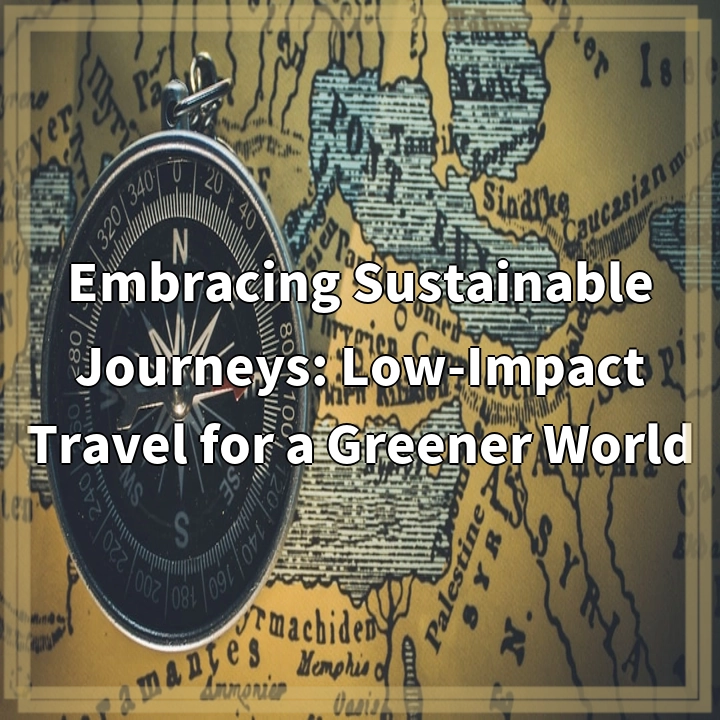
What is Low-Impact Travel?
Low-impact travel, also known as sustainable travel or eco-tourism, refers to a responsible and ethical approach to exploring the world while minimizing negative environmental and social impacts. It involves making conscious choices to reduce carbon emissions, conserve resources, respect local cultures, and support local economies.
Real-World Problems Associated with Low-Impact Travel
While low-impact travel is gaining popularity and recognition, it still faces several challenges and hurdles in achieving its goals:
1. Carbon Footprint:
One of the primary concerns of travel is the carbon emissions generated by transportation. From flights to vehicle emissions, these contribute significantly to climate change. Despite efforts to promote greener alternatives, reducing the carbon footprint of travel remains a crucial challenge.
2. Overtourism:
Popular tourist destinations often face the issue of overtourism, where the influx of visitors exceeds the carrying capacity of the location. This leads to overcrowding, damage to natural habitats, strain on resources, and disruption of the local community’s way of life. Balancing tourist numbers with sustainable management is crucial to mitigate these negative impacts.
3. Waste Management:
Travel generates a significant amount of waste, including plastic bottles, food packaging, and disposable items. In many places, waste management systems are inadequate to handle the increasing tourist numbers, leading to pollution of natural environments and harm to local wildlife. Developing effective waste management strategies is essential for low-impact travel.
4. Local Community Empowerment:
Low-impact travel should benefit local communities by supporting their economies and preserving their cultural heritage. However, in some cases, large corporations and international chains dominate the tourism industry, leaving locals with limited economic opportunities and cultural erosion. Ensuring a fair distribution of tourism benefits and creating avenues for community involvement are important challenges.
5. Greenwashing:
Greenwashing refers to the misleading or false claims made by businesses or destinations to appear more environmentally friendly than they actually are. This creates confusion for travelers who are trying to make sustainable choices. Overcoming greenwashing and promoting transparency and authenticity in the travel industry is an ongoing challenge.
In addressing these real-world problems, it is important for individuals, businesses, and governments to work together to promote and support low-impact travel practices. By raising awareness, enforcing regulations, and implementing innovative solutions, we can create a greener world for future generations.

Solutions for Low-Impact Travel
Addressing the real-world problems associated with low-impact travel requires collective efforts and innovative solutions. Here are some strategies to promote sustainable and responsible travel:
1. Carbon Offsetting and Sustainable Transportation:
Travelers can offset their carbon footprint by supporting projects that reduce greenhouse gas emissions. Additionally, choosing greener transportation options such as trains or buses instead of flights, or opting for hybrid or electric vehicles, can significantly reduce carbon emissions.
2. Responsible Destination Management:
Destinations can implement responsible management practices to prevent overtourism. This involves setting visitor limits, implementing sustainable infrastructure, and promoting off-peak and lesser-known destinations. It is crucial to involve local communities in decision-making processes and empower them to benefit from tourism.
3. Waste Reduction and Management:
Travelers can minimize waste by carrying their own reusable water bottles, shopping bags, and utensils. Supporting accommodations and destinations that prioritize waste reduction and recycling can also make a difference. Governments and businesses should improve waste management infrastructure and educate tourists about proper waste disposal.
4. Community Empowerment and Fair Tourism Practices:
Promoting community-based tourism initiatives, such as homestays or locally-owned accommodations and businesses, can empower local communities and ensure they receive economic benefits. Encouraging cultural exchange and supporting indigenous practices also helps preserve cultural heritage and diversity.
5. Transparency and Certification:
Establishing clear and credible certifications and standards for sustainable tourism can help travelers make informed choices. By supporting businesses and destinations with recognized eco-certifications, travelers can contribute to responsible practices and avoid falling victim to greenwashing.
Implementing these solutions will require collaboration between travelers, local communities, governments, and the tourism industry. By embracing these strategies, we can cultivate a more sustainable and responsible approach to travel, ensuring a greener world for generations to come.















